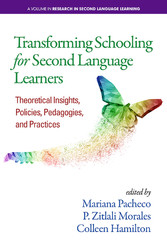Suchen und Finden
Transforming Schooling for Second Language Learners - Theoretical Insights, Policies, Pedagogies, and Practices
Mehr zum Inhalt

Transforming Schooling for Second Language Learners - Theoretical Insights, Policies, Pedagogies, and Practices
The purpose of Transforming Schooling for Second Language Learners: Theoretical Insights, Policies, Pedagogies, and Practices is to bring together educational researchers and practitioners who have implemented, documented, or examined policies, pedagogies, and practices in and out of classrooms and in real and virtual contexts that are in some way transforming what we know about the extent to which emergent bilinguals (EBs) learn and achieve in educational settings. In the following chapters, scholars and researchers identify both (1) the current state of schooling for EBs, from their perspective, and (2) the particular ways that policies, pedagogies, and/or practices transform schooling as it currently exists for EBs in discernible ways based on their scholarship and research.
Drawing on current and seminal research in fields including second language acquisition, applied linguistics, sociolinguistics, and educational linguistics, contributing authors draw on complementary theoretical, methodological, and philosophical frameworks that attend to the social, cultural, political, and ideological dimensions of being and becoming bi/multilingual and bi/multiliterate in schools and in the United States. In sum, we are deeply committed to asserting hope, possibility, and potential to discussions and discourses about bi/multilingual students. We value the urgency around improving the conditions, experiences, and circumstances in which they are learning languages and academic content. Our aim is to highlight perspectives, conceptualizations, orientations, and ideologies that disrupt and contest legacies of deficit thinking, linguistic purism, language standardization, and racism and the racialization of ethnolinguistic minorities.
Alle Preise verstehen sich inklusive der gesetzlichen MwSt.





